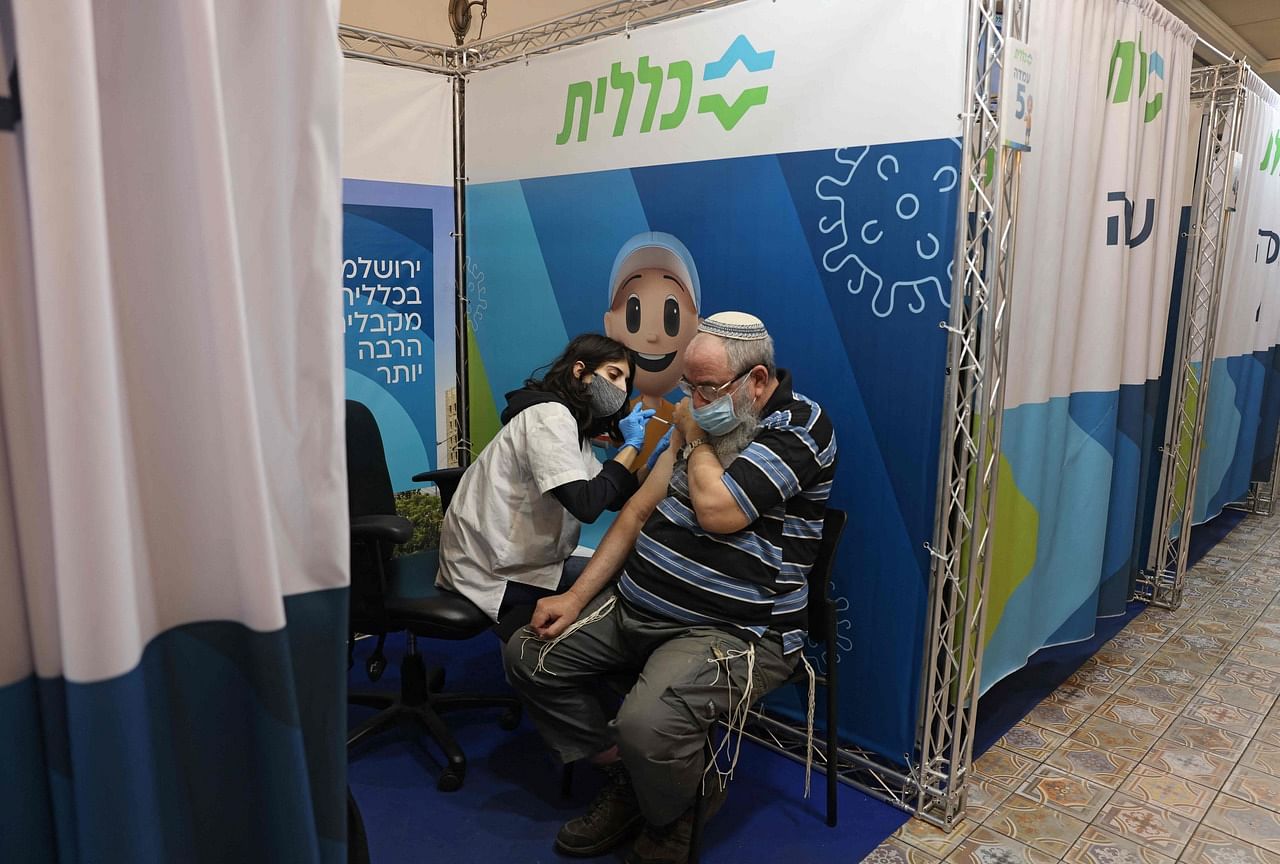How governments around the world are keeping up with shifting Covid-19 vaccination goals
Sign up now: Get insights on Asia's fast-moving developments

People queueing up to receive a Covid-19 vaccine at a shopping mall in Hong Kong on Sept 2, 2021.
PHOTO: EPA-EFE
HONG KONG - Vaccination coverage of a population and, most recently, the number of shots to be given have turned into a moving goal post as governments around the world race against time to control the Covid-19 pandemic amid the emergence of more infectious variants such as Delta and Mu.
The fluidity of the situation, combined with vaccine shortages, vaccine hesitancy and difficulties in rolling out a wide-scale inoculation programme, has resulted in some governments missing their initial vaccination targets.
Hong Kong, for instance, has extended by a month to end-September its target of having 70 per cent of its 7.5 million population getting at least one shot. So far, the figure has crossed 60 per cent.
Even as Chief Executive Carrie Lam on Tuesday (Aug 31) announced the extension, she said ambitiously that "the goal for any place is to achieve 100 per cent vaccination".
She noted that the utmost priority for Hong Kong, which has a zero-local infection approach, is to control the pandemic and prevent imported cases from spreading to the community.
Epidemiologist Ben Cowling, a professor at the University of Hong Kong, said "high vaccination coverage is not a requirement for sustaining the zero-Covid-19 strategy" - an approach that can be achieved by strict on-arrival controls and swift stubbing out of any community outbreak.
Looking at the first 12 months of the pandemic when countries such as China, Singapore, Australia and New Zealand had no vaccination coverage, Prof Cowling noted that they had "fairly successfully" implemented the zero-Covid-19 strategy.
Like Hong Kong, the United States missed its vaccination target by a month, with 70 per cent of adults getting at least one shot in early August instead of July.
Limited vaccine supplies forced Vietnam to scale down original expectations significantly, but it now aims to fully inoculate at least 70 per cent of the population aged 18 and above by end-2021 or early 2022.
The situation is worse in South Korea as the shortage of Moderna vaccines looks set to derail plans to inoculate 70 per cent of the 51.3 million population with a first dose by Sept 18. Also unlikely is President Moon Jae-in's latest goal of having 70 per cent of the population receive the two jabs by end-October.
Although Japan was hit with a string of hiccups in its vaccination roll-out, including slow distribution, it managed to meet its target for inoculating all willing seniors. About nine in 10 seniors are fully vaccinated, with half of the 131 million doses administered so far given to them.
But there are concerns that vaccinations for the wider public will be affected after last week's discovery of contaminants in a few batches of Moderna vaccines, resulting in several municipalities temporarily halting their use.
Cambodia is ahead of its initial schedule to get 10 million of its 16 million population inoculated by early 2022, due to a steady supply of Chinese-made vaccines.
Others like Malaysia and Indonesia are under mounting pressure to ramp up the inoculation drive.
Malaysia's plan to vaccinate 80 per cent of the population by the first quarter of 2022 was brought forward to December. In July, former prime minister Muhyiddin Yassin said all adults would be fully vaccinated by October.
Indonesia wants to offer two million doses daily from this month so that it can complete the inoculation drive by January.
As for Thailand, it now wants 70 per cent of more than 70 million people to get two shots instead of one before the year end to prepare for a wider reopening in 2022.
Different states in Australia have different targets, but the country hopes to end lockdowns and reopen its economy when at least 80 per cent of residents aged 16 and above are fully vaccinated.
Amid this shifting of goals around the world, what it means to be fully vaccinated may change too.
Israel, which is facing one of its worst Covid-19 outbreaks despite having one of the highest vaccination rates, no longer recognises those with two Pfizer jabs as being fully vaccinated. Instead, that definition is only for people who have had a third booster jab.
So far, more than two million of Israel's 9.3 million population have had a third shot, including 70 per cent of those aged 60 and above, and about half of those above 50.

PHOTO: AFP
PHOTO: AFP
Most other governments still recognise having two jabs as being fully inoculated, but some are already providing booster shots or considering giving out the third jabs to their people.
The Joe Biden administration had given nearly one million people booster shots by mid-August, while Indonesian medical workers have had theirs.
In Cambodia, after questions arose about the efficacy of the Chinese vaccines, the authorities gave AstraZeneca booster jabs to front-line workers in August. This policy was then extended to the general population and is to run as long as doses are available.
In Hong Kong and Japan, discussions of third jabs are on the radar but the sluggish vaccination rates mean this is not a priority.
The main discussion in Thailand is about the mixing of jabs, while Australia is due to receive advice on a booster roll-out from its advisory panel next month.
- Additional reporting by Chang May Choon in Seoul, Charissa Yong in Washington, Hazlin Hassan in Kuala Lumpur, Jonathan Pearlman in Sydney, Linda Yulisman in Indonesia, Tan Hui Yee in Indochina, Tan Tam Mei in Bangkok and Walter Sim in Tokyo.


